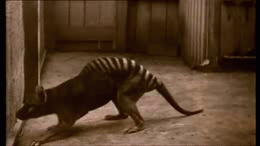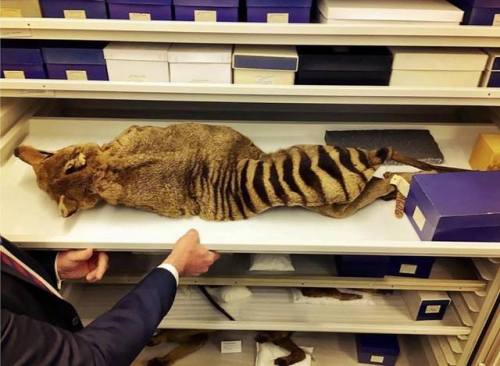
Collection of media revolving around the Thylacine
149 posts
Latest Posts by moonlight-wolf-archive - Page 4

Thylacine By: W. S. Berridge From: A History of Land Mammals in the Western Hemisphere 1913

General Zoology. Written by Mary J. Guthrie and John M. Anderson. 1957.
Internet Archive




some more images of the thylacine you have probably never seen before

thylacine you have probably never seen before

I found this interesting thylacine image I have not seen before

You’ve seen art of wolves under aurora borealis, well here’s a literal polar opposite
I really enjoyed wolf walkers and now it's one of my favorite movies!


Thylacine energy
TONIGHT. WE’RE DRINKING FROM THE POND.

Thylacine art on an Australian stamp first day cover from 1962.

Australian thylacine stamp from 1962.
Damn I also think of thylacines and laika a bunch. That's nuts.







“In the collection stores of the Australian Museum is this beautiful specimen which has kept its vibrant fur thanks to minimal exposure to light or touch. As our Manager, Programs Matt put it, “Pulling the drawer open is an awe-inspiring, solemn and shameful experience.”
From The Australian Museum on Facebook.
i miss thylacines

Thylacine from Animals of the World, Oddhams Press.

A woman looks into a diorama of three Thylacines, date and location unknown. [ x ]

thylacine shelf

a thylacine on kunanyi/mt wellington
eyesperceive:
well this is an interesting animal… thylacine


Halloween art piece:)
Enjoy
Also if you understand the tombstones, kudos!!!!

Vanished Species, written by David Day, published in 1989. Illustration by Maurice Wilson.

Antique Magic Lantern glass slide of a thylacine. Magic Lanterns are an early type of image projector used for entertainment and educational purposes from the 17th to 19th centuries.
Just found out about thylacines



In these pictures, the Swedish Museum of Natural History’s exquisite adult female thylacine wet specimen has been removed from her jar for a 3D scan. Dr. Justin Williams used an Artec Space Spider scanner to image this specimen in submillimeter 3D.
Dr. Williams and his team scanned thylacine specimens from a total of 18 institutions for their research project, which aimed to determine the true size of the thylacine. Their publication is titled: “Did the thylacine violate the costs of carnivory? Body mass and sexual dimorphism of an iconic Australian marsupial.” [x]



Brighton Thylacine details, an eye and a front and back foot. This thylacine taxidermy can be found at the Booth Museum, Brighton. (handy reference for artists and model makers.)

The Brighton Thylacine, at the Booth Natural History Museum. The egg is a Great Auk egg. Although the museum is mainly a memorial to several Victorian collectors, the exhibits now have a strong conservation message, and they really do need more visitors and donations to preserve the collections.

Doggeroo.
The Bristol thylacine looks wistfully out of his glass box.
Sorry for being blurry but I had to use a long exposure on my phone.

The Brighton Thylacine. This specimen lives in the Booth Natural History Museum and is on display at the time of writing. The collection consists of natural history specimens collected by several Victorian collectors,(mostly taxidermy birds) plus others donated and found by locals. The museum now is themed around conservation and education.
The Thylacine was collected and mounted in the 1870s and is sadly quite faded, it is missing it’s stripes, though there is a chance it might not have had any. The feet are well preserved, as is it’s face. The display allows you to get close. I took more detailed photos which I will post.

via
TASSIE TIME!!!

I had the chance to visit the Oslo thylacine! It's currently on display at the Museum of Natural History in Oslo, Norway.
It's just SUCH a good specimen, really well preserved for how old it is. It's been in Norway since 1888 but barely has any bad spots unless you look up really close. There was a furless spot on the leg and behind the ear, other than that it looks brand new and almost alive! I keep expecting it to turn its head to look at me, knowing it wouldn't :(
It's also a bit too short for accurate thylacine proportions, but I think that just has to do with how much they stretched the wires in the legs when mounting it. Very accurate otherwise, might be my favorite specimen!
Really happy they gave it a cute environment to be in, too. Before it was just a green stand, now it has a pretty painting and grass around it so it looks like it's still roaming the depths of Tasmania

They also have a skull on display (thylacine on top and grey wolf on bottom, to show examples of convergent evolution), tho I'm almost sure that was a replica. Pretty cool still! They're so small upclose, but the specimen itself is bigger than I thought it'd be
I was overtaken by a deep sense of longing when looking at it. It's strange to think this was a living creature once, but everyone who saw it alive is long gone. But this remains. This mounted animal survived both word wars, it has been on this Earth longer than any human alive today has. If taken care properly, it will be here long after everyone today is gone, remaining a grim reminder to future generations of humanity's greed.
Still, pretty cool. Just wish I could see a living one too. Rest in peace doggo thing.
Bonus: they also had a great auk, which is another animal recently extinct by men. I didn't know about this one at all, it was really cool to see it there!



